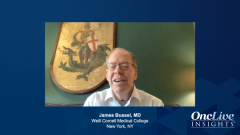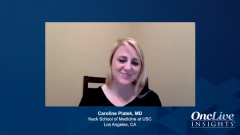
Experimental Agents for ITP
ITP experts discuss emerging ITP treatment landscape.
Episodes in this series

Craig Kessler, MD: Sutimlimab is a humanized monoclonal antibody that selectively inhibits activation of the complement pathway by binding to complement 1S. This drug, which is not approved, will be marketed by Sanofi. It was originally developed for cold agglutinin disease, for which there are very few successful approaches to treatment. Following the success in the cold agglutinin population, it was trialed in ITP [immune thrombocytopenic purpura]. The best study available with sutimlimab was reported by my colleague Dr Catherine Broome at ASH [American Society of Hematology Annual Meeting] 2020. This was a pilot phase 1 study. It included only 12 patients, but these patients were pretty beaten up. They had a median of over 4 prior failed therapies for their ITP. What was remarkable about this population is that with the treatment with sutimlimab, they had extremely rapid responses. It was much faster than what you saw even with avatrombopag, which is an even faster response than with eltrombopag. The first patient I gave to Dr Broome to treat had been refractory for years, with platelet counts running less than 10,000 per mm3. Within almost a day, her platelet count had tripled into a nondangerous area. We were so impressed.
The rest of the patients in this pilot trial also had very impressive responses, but not all developed complete responses. Eventually with some dose-response analysis, which they’re going to be doing in ongoing phase 2/3 clinical trials, we’ll be able to see some interesting responses. The importance of this study is not just the availability of a potential new agent. It also tells us about the heterogeneity of ITP and that not all ITPs are alike. Taking your point, Jim, ITP isn’t a single disease, and it has a single phenotype that we’ve relied on. Studies like this indicate that we have to be much more careful in stratifying how we use different agents for different patients.
James Bussel, MD: Could you say a word about the toxicity?
Craig Kessler, MD: In the pilot study, there were very few SAEs [serious adverse events]. In fact, the patients in the study were stopped after 12 weeks and then went back to their baseline levels of very low platelet counts. If restarted on the sutimlimab, there were equally robust responses after rechallenging. Right now, this appears to be a relatively safe product. There doesn’t appear to be any increased risk of infection, which you would be concerned about by blocking any classical pathways of complement activation. I’d be very careful about making sure that these patients are adequately vaccinated prior to the initiation of this drug. Thus far, there have been no dangerous signals.
Caroline Piatek, MD: BTK is involved in the innate and adaptive immune responses and is a signaling molecule in immune-mediated diseases. The BTK inhibitor that’s farthest along in clinical trials is rilzabrutinib. The most recent data was updated at ASH. This was a phase 1/2 study that included 45 patients treated with rilzabrutinib at 400 mg orally twice daily. These were heavily pretreated patients. The response rate was about 40%, and this was seen on the fast side, usually within 2 weeks. Of note, this BTK inhibitor doesn’t affect platelet aggregation, which has been an issue with other BTK inhibitors and would be, of course, important in consideration for patients with ITP. The most common adverse effects were diarrhea and nausea.
James Bussel, MD: I’m gonna mention briefly FcRn inhibitors. There are at least 4 or 5 in trial. Some of them have had nice phase 2 studies in ITP and are in the midst of phase 3 studies with ITP. The thing that strikes me is that first, you lower the IgG levels substantially. This could be to 200 mg/dL with a lower limit of normal of a little over 600 mg/dL, yet there don’t seem to be infections. That’s explained by the fact that you’re not affecting IgA or IgM and presumably not affecting T-cell function, but all this remains to be clarified.
Transcript Edited for Clarity







































